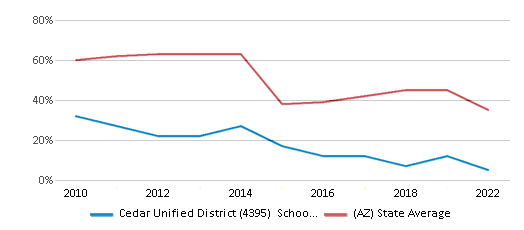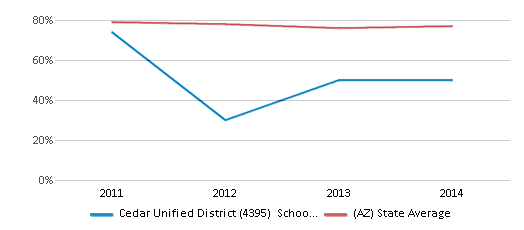Top Rankings
Cedar Unified District (4395) School District ranks among the top 20% of public school district in Arizona for:
Category
Attribute
Student Attention
Lowest student:teacher ratio (Top 1%)
For the 2025 school year, there is 1 public elementary school serving 118 students in Cedar Unified District (4395) School District. This district's average elementary testing ranking is 1/10, which is in the bottom 50% of public elementary schools in Arizona.
Public Elementary School in Cedar Unified District (4395) School District have an average math proficiency score of 5% (versus the Arizona public elementary school average of 34%), and reading proficiency score of 8% (versus the 40% statewide average).
Minority enrollment is 100% of the student body (majority American Indian), which is more than the Arizona public elementary school average of 67% (majority Hispanic).
Overview
This School District
This State (AZ)
# Schools
2 Schools
1,644 Schools
# Students
118 Students
761,365 Students
# Teachers
11 Teachers
33,884 Teachers
Student : Teacher Ratio
11:1
11:1
District Rank
Cedar Unified District (4395) School District, which is ranked within the bottom 50% of all 607 school districts in Arizona (based off of combined math and reading proficiency testing data) for the 2021-2022 school year.
Overall District Rank
#618 out of 631 school districts
(Bottom 50%)
(Bottom 50%)

Math Test Scores (% Proficient)
≤5%
35%

Reading/Language Arts Test Scores (% Proficient)
6-9%
40%

Science Test Scores (% Proficient)
≤20%
24%
Graduation Rate
(13-14)<50%
77%

Students by Ethnicity:
Diversity Score
0.08
0.66
# American Indian Students
113 Students
37,923 Students
% American Indian Students
96%
5%
# Asian Students
n/a
26,420 Students
% Asian Students
n/a
4%
# Hispanic Students
3 Students
360,618 Students
% Hispanic Students
2%
47%
# Black Students
n/a
44,373 Students
% Black Students
n/a
6%
# White Students
n/a
254,564 Students
% White Students
n/a
33%
# Hawaiian Students
n/a
2,710 Students
% Hawaiian Students
n/a
n/a
# Two or more races Students
2 Students
34,724 Students
% of Two or more races Students
2%
5%
Students by Grade:
# Students in PK Grade:
-
18,007
# Students in K Grade:
16
73,126
# Students in 1st Grade:
8
78,842
# Students in 2nd Grade:
16
82,537
# Students in 3rd Grade:
10
80,342
# Students in 4th Grade:
10
82,920
# Students in 5th Grade:
10
83,092
# Students in 6th Grade:
12
83,167
# Students in 7th Grade:
16
67,887
# Students in 8th Grade:
20
68,279
# Students in 9th Grade:
-
9,715
# Students in 10th Grade:
-
10,079
# Students in 11th Grade:
-
10,225
# Students in 12th Grade:
-
12,604
# Ungraded Students:
-
543
District Revenue and Spending
The revenue/student of $34,508 is higher than the state median of $11,421. The school district revenue/student has declined by 11% over four school years.
The school district's spending/student of $32,314 is higher than the state median of $11,323. The school district spending/student has declined by 11% over four school years.
Total Revenue
$4 MM
$12,837 MM

Spending
$4 MM
$12,727 MM

Revenue / Student
$34,508
$11,421

Spending / Student
$32,314
$11,323

Best Cedar Unified District (4395) School District Public Elementary Schools (2025)
School
(Math and Reading Proficiency)
(Math and Reading Proficiency)
Location
Grades
Students
Rank: #11.
Jeddito School
(Math: ≤5% | Reading: 6-9%)
Rank:
Rank:
1/
Bottom 50%10
Mile Post 408 Highway 264
Keams Canyon, AZ 86034
(928) 738-2334
Keams Canyon, AZ 86034
(928) 738-2334
Grades: PK-8
| 118 students
Recent Articles

What Is A Charter School?
Explore the world of charter schools in this comprehensive guide. Learn about their history, how they operate, and the pros and cons of this educational innovation. Discover key facts about charter schools, including admission policies, demographics, and funding, as well as what to look for when considering a charter school for your child.

10 Reasons Why High School Sports Benefit Students
Discover the 10 compelling reasons why high school sports are beneficial for students. This comprehensive article explores how athletics enhance academic performance, foster personal growth, and develop crucial life skills. From improved fitness and time management to leadership development and community representation, learn why participating in high school sports can be a game-changer for students' overall success and well-being.

February 05, 2025
Understanding the U.S. Department of Education: Structure, Impact, and EvolutionWe explore how the Department of Education shapes American education, from its cabinet-level leadership to its impact on millions of students, written for general audiences seeking clarity on this vital institution.





